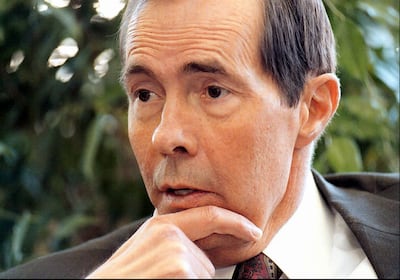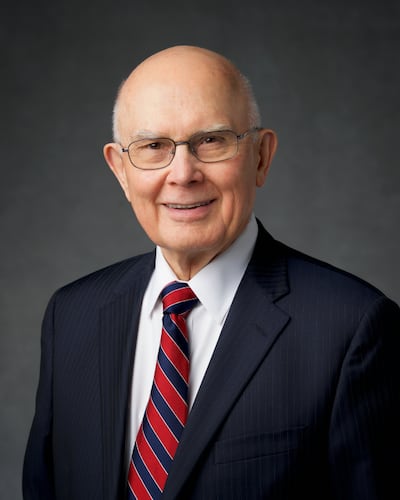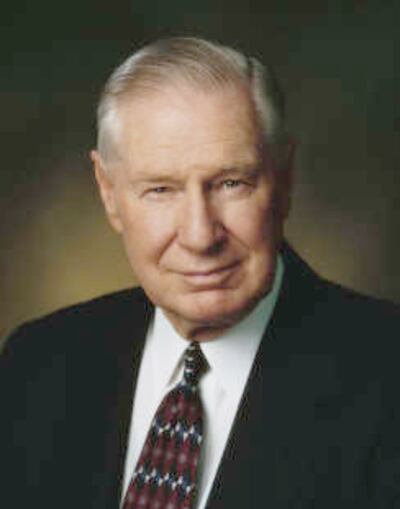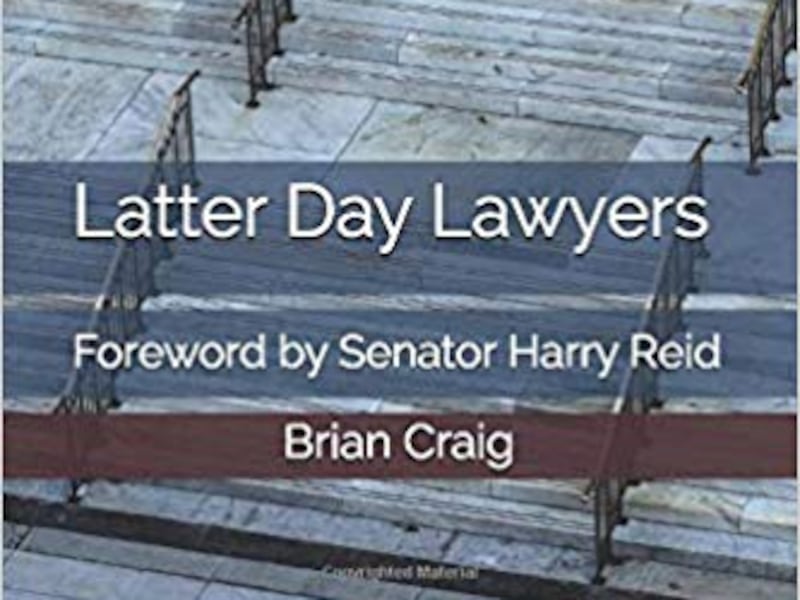Members from many faiths have influenced the legal profession for good. In “Latter Day Lawyers,” attorney Brian Craig provides a collection of biographies about lawyers and judges belonging to The Church of Jesus Christ of Latter-day Saints.
“The book unveils how a select group of lawyers and judges ... influenced the constitutional and legal rights of all Americans under the backdrop of landmark and intriguing cases,” Craig said in an email interview.
Inspired by “Profiles in Courage” by John F. Kennedy, Craig tells the stories of 18 fascinating figures, including Rex Lee, Dallin H. Oaks, J. Reuben Clark, A. Sherman Christensen and James E. Faust.
Rex Lee
Rex Lee is known to many as the late father of Sen. Mike Lee and the former president of BYU, but his star burns just as bright in the legal field.

Lee attended BYU for his undergraduate degree and completed his law degree at the University of Chicago. One of his professors was President Dallin H. Oaks, now first counselor in the church’s First Presidency, who accompanied Lee to Washington, D.C., in hopes of landing him a coveted internship on the U.S. Supreme Court. After the duo returned, President Oaks received a phone call from Chief Justice Earl Warren, for whom he had clerked years previous, recounted in “Latter Day Lawyers.”
“Would you feel bad if I didn’t hire your friend, Rex Lee?” asked the chief justice. “Whizzer White wants him,” Warren said, referencing another Supreme Court Justice who saw Lee’s potential.
Lee would go on to clerk for the court and later argue scores of cases in front of the nation’s highest legal body as solicitor general for President Ronald Reagan.
“He is undoubtedly one of the most successful lawyers to ever argue cases before the U.S. Supreme Court,” said Craig. “Everyone I talked to (while researching the book) said that Rex Lee is the most influential lawyer who was a member of the church — bar none.”
Dallin H. Oaks
President Dallin H. Oaks might be best known as a member of the First Presidency, but his legal career is similarly memorable.

A graduate of the University of Chicago Law School, President Oaks secured a prestigious clerkship with Warren, then chief justice. The two found themselves of very different political leanings.
“Chief Justice Earl Warren was an unlikely mentor and boss for a conservative lawyer like me,” Craig records President Oaks saying. “My year clerking for the chief justice was challenging, satisfying and far-reaching.”
President Oaks accepted a position as president of BYU at the age of 39. After a decade of service, he was asked to join the Utah Supreme Court. He wrote 148 opinions for the court before resigning to accept as call to serve in the Quorum of the Twelve Apostles.
Other highlights of his legal life include teaching at the University of Chicago Law School, helping to establish the J. Reuben Clark Law School at BYU, and writing “The Carthage Conspiracy,” a book which details the events surrounding the martyrdom of Joseph Smith from a legal perspective.
One of his fondest legal memories is arguing a case in the same courtroom where Abraham Lincoln appeared nearly 200 times.
J. Reuben Clark
President J. Reuben Clark served in the First Presidency for nearly three decades, leaving behind a promising legal career to do so.

President Clark had a love for learning from a young age. “His father once related that young Reuben would ’rather miss his meals than to miss a day from school,’” Craig writes. President Clark attempted to parlay his affinity for learning into a self-taught legal career, but realized he needed a formal education.
Utah didn’t have a law school at the time, so President Clark moved East after receiving a priesthood blessing from President Joseph F. Smith.
“(Smith) set him apart on a type of mission ‘to be an exemplary Latter-day Saint among the gentiles of the world,” Craig said.
President Clark went on to become a renowned international lawyer. “Clark’s greatest impact as a lawyer remains his famous Clark Memorandum interpreting the Monroe Doctrine used in American foreign policy,” Craig said.
A. Sherman Christensen
“Judge A. Sherman Christensen was the first federal district judge in Utah who was a member of The Church of Jesus Christ of Latter-day Saints,” Craig said.
Christensen was an exemplary lawyer who had the chance to display a high moral character on more than one occasion.
At the time, Federal Judge Willis Ritter presided as chief judge. In the preface to “Latter Day Lawyers,” former Sen. Harry Reid describes Ritter as “a nemesis of nearly everyone and every institution.” Ritter’s reputation was well-earned and he did everything in his power to make life miserable for Christensen.
Despite being constantly undermined, Christensen persisted in being the best judge he could be. “Even if he ruled against you, people always thought he was fair,” said Christensen’s former law clerk in an interview for “Latter Day Lawyers.”
Christensen took early retirement due to the tension with Ritter, but that wasn’t the end of his story.
“Judge Christensen later served as a judge ‘sitting by designation’ in other federal appeals courts when he was appointed by Supreme Court Chief Justice Warren Burger,” Craig said.
James E. Faust
“Many lawyers would consider arguing a case before the state supreme court a major highlight of their career. James E. Faust had the opportunity to argue a total of 17 cases before the Utah Supreme Court between 1954 and 1972,” said Craig. “(It was) likely more than any other lawyer in private practice during the same period.”

Before President Faust was called to serve in the Quorum of the Twelve Apostles, he received a law degree from the University of Utah and practiced “door law” — the term used by lawyers who would represent anyone who came through their doors. In President Faust’s case, he represented clients in family law, criminal law and medical malpractice.
President Faust also tried his hand at writing the law and served one term in the Utah House of Representatives.
While serving as Utah State Bar president, he envisioned a service that would promote legal education and make Utahns more aware of legal resources. He made this idea a reality when he founded the Utah Bar Foundation in 1963. President Faust also worked tirelessly to protect civil rights and was appointed to the Lawyers Committee for Civil Rights Under Law by President John F. Kennedy.
President Faust is the namesake of the James E. Faust Law Library at the University of Utah S. J. Quinney Law School.
Kurt Manwaring is a freelance writer and contributor to the Deseret News. He is online at fromthedesk.org, and on Twitter at @fromthedesk_

